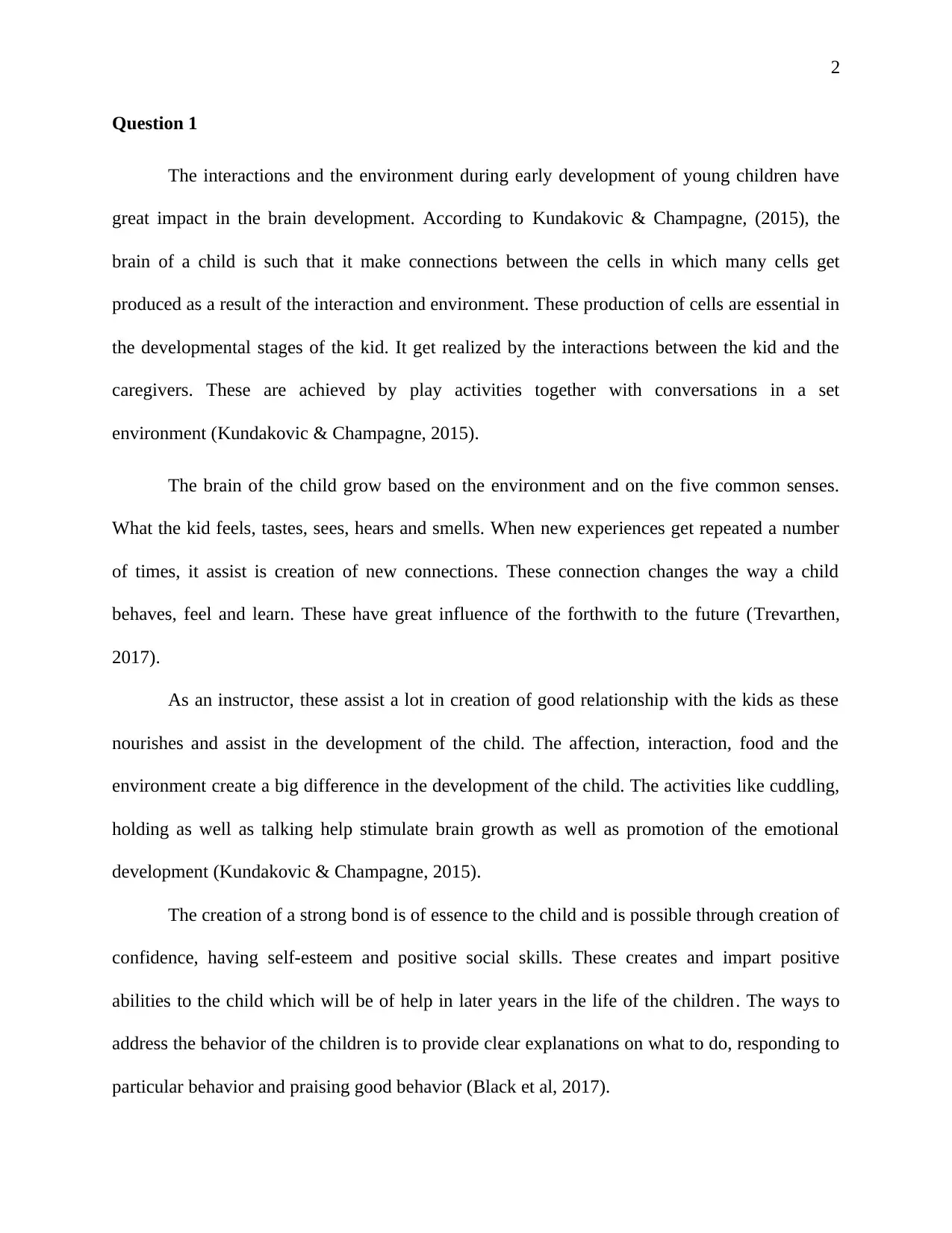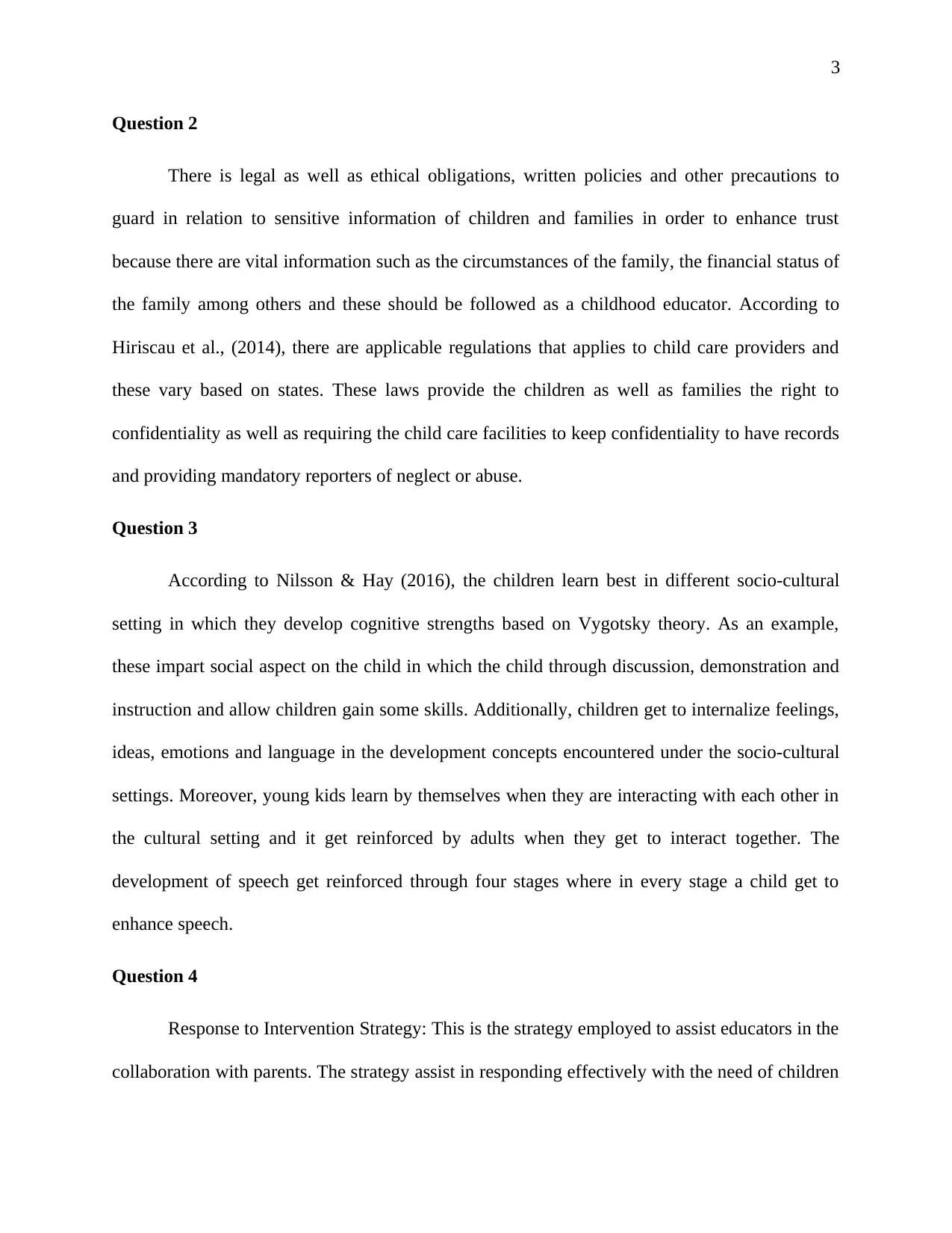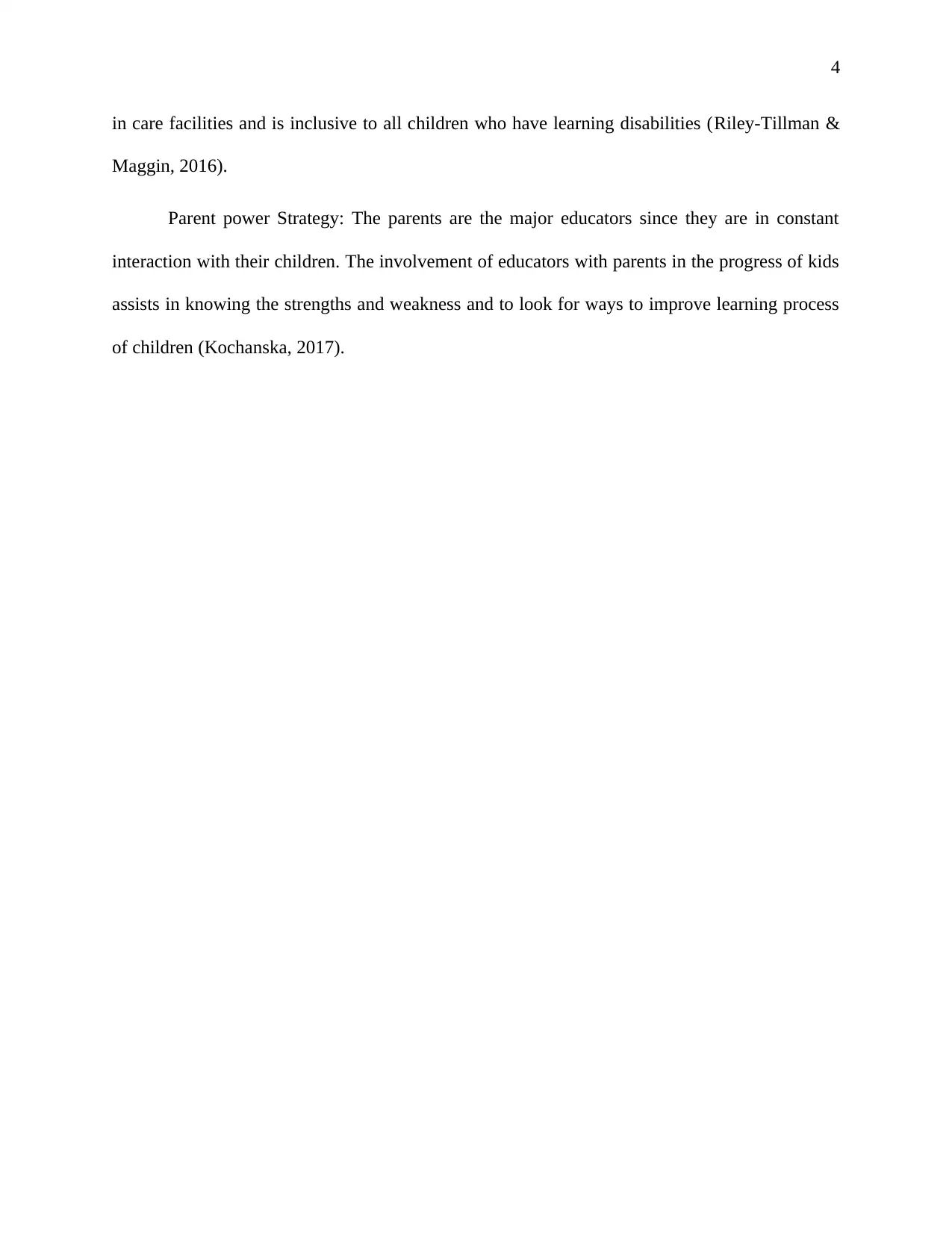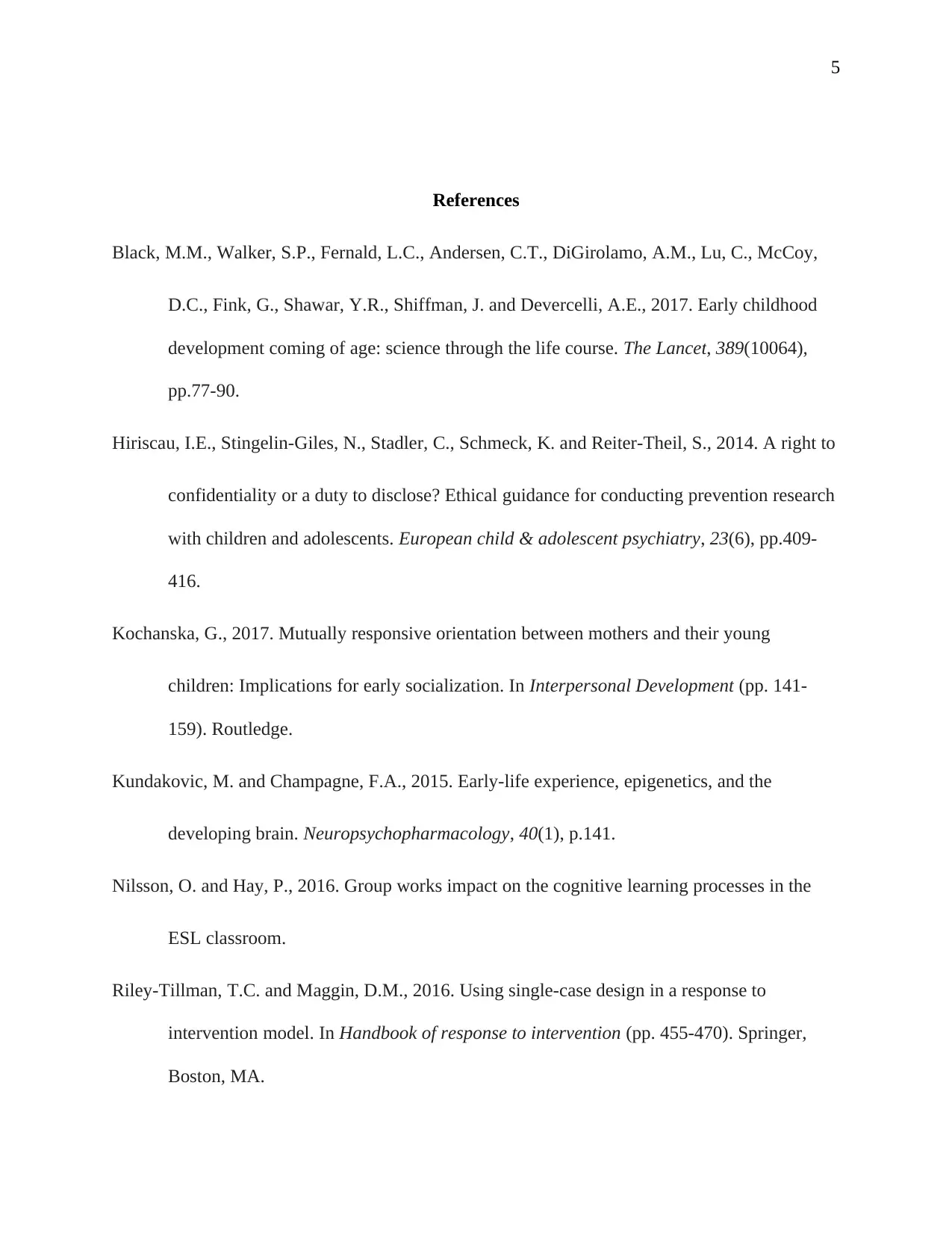Early Childhood Education and Care Assignment: Brain and Behavior
VerifiedAdded on 2021/04/21
|6
|1009
|22
Homework Assignment
AI Summary
This assignment delves into key aspects of early childhood education and care. It begins by examining the profound impact of early interactions and the environment on brain development, emphasizing the role of caregivers, play, and sensory experiences. It discusses how these interactions shape a child's behavior, feelings, and learning, highlighting the importance of creating strong bonds and providing clear behavioral guidance. The assignment also addresses legal and ethical obligations concerning sensitive information, emphasizing the importance of confidentiality and mandatory reporting. Furthermore, it explores how children learn within socio-cultural settings, referencing Vygotsky's theory and the role of interaction and language development. Finally, the assignment introduces two strategies: Response to Intervention, for addressing children's needs, and Parent Power, for involving parents in the learning process.

1
Early Childhood Education and Care
Student’s Name:
Institution:
Early Childhood Education and Care
Student’s Name:
Institution:
Paraphrase This Document
Need a fresh take? Get an instant paraphrase of this document with our AI Paraphraser

2
Question 1
The interactions and the environment during early development of young children have
great impact in the brain development. According to Kundakovic & Champagne, (2015), the
brain of a child is such that it make connections between the cells in which many cells get
produced as a result of the interaction and environment. These production of cells are essential in
the developmental stages of the kid. It get realized by the interactions between the kid and the
caregivers. These are achieved by play activities together with conversations in a set
environment (Kundakovic & Champagne, 2015).
The brain of the child grow based on the environment and on the five common senses.
What the kid feels, tastes, sees, hears and smells. When new experiences get repeated a number
of times, it assist is creation of new connections. These connection changes the way a child
behaves, feel and learn. These have great influence of the forthwith to the future (Trevarthen,
2017).
As an instructor, these assist a lot in creation of good relationship with the kids as these
nourishes and assist in the development of the child. The affection, interaction, food and the
environment create a big difference in the development of the child. The activities like cuddling,
holding as well as talking help stimulate brain growth as well as promotion of the emotional
development (Kundakovic & Champagne, 2015).
The creation of a strong bond is of essence to the child and is possible through creation of
confidence, having self-esteem and positive social skills. These creates and impart positive
abilities to the child which will be of help in later years in the life of the children. The ways to
address the behavior of the children is to provide clear explanations on what to do, responding to
particular behavior and praising good behavior (Black et al, 2017).
Question 1
The interactions and the environment during early development of young children have
great impact in the brain development. According to Kundakovic & Champagne, (2015), the
brain of a child is such that it make connections between the cells in which many cells get
produced as a result of the interaction and environment. These production of cells are essential in
the developmental stages of the kid. It get realized by the interactions between the kid and the
caregivers. These are achieved by play activities together with conversations in a set
environment (Kundakovic & Champagne, 2015).
The brain of the child grow based on the environment and on the five common senses.
What the kid feels, tastes, sees, hears and smells. When new experiences get repeated a number
of times, it assist is creation of new connections. These connection changes the way a child
behaves, feel and learn. These have great influence of the forthwith to the future (Trevarthen,
2017).
As an instructor, these assist a lot in creation of good relationship with the kids as these
nourishes and assist in the development of the child. The affection, interaction, food and the
environment create a big difference in the development of the child. The activities like cuddling,
holding as well as talking help stimulate brain growth as well as promotion of the emotional
development (Kundakovic & Champagne, 2015).
The creation of a strong bond is of essence to the child and is possible through creation of
confidence, having self-esteem and positive social skills. These creates and impart positive
abilities to the child which will be of help in later years in the life of the children. The ways to
address the behavior of the children is to provide clear explanations on what to do, responding to
particular behavior and praising good behavior (Black et al, 2017).

3
Question 2
There is legal as well as ethical obligations, written policies and other precautions to
guard in relation to sensitive information of children and families in order to enhance trust
because there are vital information such as the circumstances of the family, the financial status of
the family among others and these should be followed as a childhood educator. According to
Hiriscau et al., (2014), there are applicable regulations that applies to child care providers and
these vary based on states. These laws provide the children as well as families the right to
confidentiality as well as requiring the child care facilities to keep confidentiality to have records
and providing mandatory reporters of neglect or abuse.
Question 3
According to Nilsson & Hay (2016), the children learn best in different socio-cultural
setting in which they develop cognitive strengths based on Vygotsky theory. As an example,
these impart social aspect on the child in which the child through discussion, demonstration and
instruction and allow children gain some skills. Additionally, children get to internalize feelings,
ideas, emotions and language in the development concepts encountered under the socio-cultural
settings. Moreover, young kids learn by themselves when they are interacting with each other in
the cultural setting and it get reinforced by adults when they get to interact together. The
development of speech get reinforced through four stages where in every stage a child get to
enhance speech.
Question 4
Response to Intervention Strategy: This is the strategy employed to assist educators in the
collaboration with parents. The strategy assist in responding effectively with the need of children
Question 2
There is legal as well as ethical obligations, written policies and other precautions to
guard in relation to sensitive information of children and families in order to enhance trust
because there are vital information such as the circumstances of the family, the financial status of
the family among others and these should be followed as a childhood educator. According to
Hiriscau et al., (2014), there are applicable regulations that applies to child care providers and
these vary based on states. These laws provide the children as well as families the right to
confidentiality as well as requiring the child care facilities to keep confidentiality to have records
and providing mandatory reporters of neglect or abuse.
Question 3
According to Nilsson & Hay (2016), the children learn best in different socio-cultural
setting in which they develop cognitive strengths based on Vygotsky theory. As an example,
these impart social aspect on the child in which the child through discussion, demonstration and
instruction and allow children gain some skills. Additionally, children get to internalize feelings,
ideas, emotions and language in the development concepts encountered under the socio-cultural
settings. Moreover, young kids learn by themselves when they are interacting with each other in
the cultural setting and it get reinforced by adults when they get to interact together. The
development of speech get reinforced through four stages where in every stage a child get to
enhance speech.
Question 4
Response to Intervention Strategy: This is the strategy employed to assist educators in the
collaboration with parents. The strategy assist in responding effectively with the need of children
⊘ This is a preview!⊘
Do you want full access?
Subscribe today to unlock all pages.

Trusted by 1+ million students worldwide

4
in care facilities and is inclusive to all children who have learning disabilities (Riley-Tillman &
Maggin, 2016).
Parent power Strategy: The parents are the major educators since they are in constant
interaction with their children. The involvement of educators with parents in the progress of kids
assists in knowing the strengths and weakness and to look for ways to improve learning process
of children (Kochanska, 2017).
in care facilities and is inclusive to all children who have learning disabilities (Riley-Tillman &
Maggin, 2016).
Parent power Strategy: The parents are the major educators since they are in constant
interaction with their children. The involvement of educators with parents in the progress of kids
assists in knowing the strengths and weakness and to look for ways to improve learning process
of children (Kochanska, 2017).
Paraphrase This Document
Need a fresh take? Get an instant paraphrase of this document with our AI Paraphraser

5
References
Black, M.M., Walker, S.P., Fernald, L.C., Andersen, C.T., DiGirolamo, A.M., Lu, C., McCoy,
D.C., Fink, G., Shawar, Y.R., Shiffman, J. and Devercelli, A.E., 2017. Early childhood
development coming of age: science through the life course. The Lancet, 389(10064),
pp.77-90.
Hiriscau, I.E., Stingelin-Giles, N., Stadler, C., Schmeck, K. and Reiter-Theil, S., 2014. A right to
confidentiality or a duty to disclose? Ethical guidance for conducting prevention research
with children and adolescents. European child & adolescent psychiatry, 23(6), pp.409-
416.
Kochanska, G., 2017. Mutually responsive orientation between mothers and their young
children: Implications for early socialization. In Interpersonal Development (pp. 141-
159). Routledge.
Kundakovic, M. and Champagne, F.A., 2015. Early-life experience, epigenetics, and the
developing brain. Neuropsychopharmacology, 40(1), p.141.
Nilsson, O. and Hay, P., 2016. Group works impact on the cognitive learning processes in the
ESL classroom.
Riley-Tillman, T.C. and Maggin, D.M., 2016. Using single-case design in a response to
intervention model. In Handbook of response to intervention (pp. 455-470). Springer,
Boston, MA.
References
Black, M.M., Walker, S.P., Fernald, L.C., Andersen, C.T., DiGirolamo, A.M., Lu, C., McCoy,
D.C., Fink, G., Shawar, Y.R., Shiffman, J. and Devercelli, A.E., 2017. Early childhood
development coming of age: science through the life course. The Lancet, 389(10064),
pp.77-90.
Hiriscau, I.E., Stingelin-Giles, N., Stadler, C., Schmeck, K. and Reiter-Theil, S., 2014. A right to
confidentiality or a duty to disclose? Ethical guidance for conducting prevention research
with children and adolescents. European child & adolescent psychiatry, 23(6), pp.409-
416.
Kochanska, G., 2017. Mutually responsive orientation between mothers and their young
children: Implications for early socialization. In Interpersonal Development (pp. 141-
159). Routledge.
Kundakovic, M. and Champagne, F.A., 2015. Early-life experience, epigenetics, and the
developing brain. Neuropsychopharmacology, 40(1), p.141.
Nilsson, O. and Hay, P., 2016. Group works impact on the cognitive learning processes in the
ESL classroom.
Riley-Tillman, T.C. and Maggin, D.M., 2016. Using single-case design in a response to
intervention model. In Handbook of response to intervention (pp. 455-470). Springer,
Boston, MA.

6
Trevarthen, C., 2017. The function of emotions in early infant communication and development.
In New perspectives in early communicative development (pp. 48-81). Routledge.
Trevarthen, C., 2017. The function of emotions in early infant communication and development.
In New perspectives in early communicative development (pp. 48-81). Routledge.
⊘ This is a preview!⊘
Do you want full access?
Subscribe today to unlock all pages.

Trusted by 1+ million students worldwide
1 out of 6
Related Documents
Your All-in-One AI-Powered Toolkit for Academic Success.
+13062052269
info@desklib.com
Available 24*7 on WhatsApp / Email
![[object Object]](/_next/static/media/star-bottom.7253800d.svg)
Unlock your academic potential
Copyright © 2020–2026 A2Z Services. All Rights Reserved. Developed and managed by ZUCOL.




